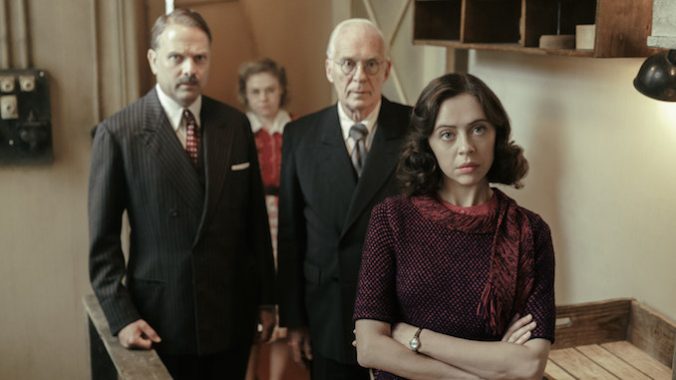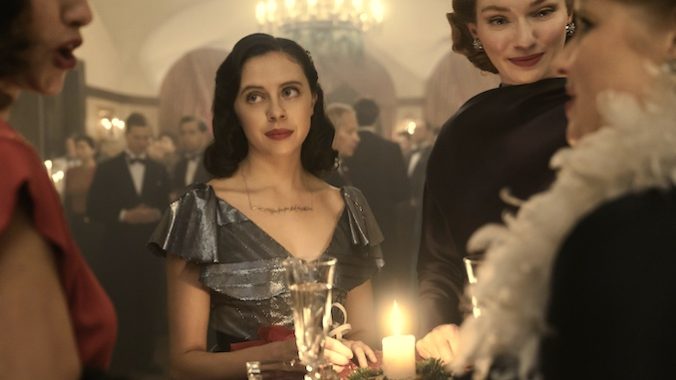A Small Light’s Liev Schreiber, Bel Powley, & EP Tony Phelan on the Importance of Miep Gies’ Story
Photo Courtesy of National Geographic
Since The Diary of Anne Frank was first published in 1947, it has been translated into more than 70 languages. Over 30 million copies of the book have been sold. Almost everyone knows the story of Anne Frank, the 13-year-old girl who hid from the Nazis with her family in a small annex in Amsterdam.
After she died, her father Otto Frank, the sole survivor of the Frank family, published the diary Anne had kept while in hiding. There have been movies, TV shows, and plays about her life. But very little has been portrayed about Miep Gies, Otto’s secretary who risked her life to hide the Frank family for almost two years. The new National Geographic series A Small Light aims to change that.
“That’s a really compelling idea to tell this story that everybody feels like they know but to tell it through a different lens,” says A Small Light executive producer and showrunner Tony Phelan.
The eight episode series tells the story from Gies’ perspective as she watches in horror at the atrocities happening around her, and risks her life every day to aid not only the Frank family but many others bringing them food, medicine, and essentials. “Anne Frank was such an icon,” says Liev Schreiber, who portrays Otto Frank. “She’s come to represent the Holocaust in so many ways. This series felt like the inside dope, and I really like it when I get the inside dope.”
Bel Powley was offered the part of Miep Gies on Holocaust Remembrance Day. To prepare for the role, she read Gies’ book Anne Frank Remembered. She visited both the Frank house and the home Gies shared with her husband Jan (Joe Cole). She biked many of the same routes Gies did throughout Amsterdam. “I just wanted to get a sense of the city and what it was like being there,” she says. “The amount of bravery she displayed, it’s completely gob-smacking. I don’t even think she knew what she was getting herself into and she did not hesitate.”
The key to the series was to portray Gies, who passed away in 2010, as a real, fully developed person—flaws and all. One of the first times viewers meet Gies she’s severely hungover. Her parents are upset that she is both jobless and husbandless. She’s a good-natured party girl with few prospects.

“With a lot of historical dramas there’s a reverence that kind of encases everything in sepia, and our intention was always to tear all that all away,” Phelan says. “These people were dealing with the same things we are. Seeing this young woman who is just a mess do this remarkable thing, surrounded by other people who do remarkable things, is pretty exciting.”
One way to make the series more approachable was to keep the dialogue more modern. “[Showrunner and executive producer] Joan [Rater] and Tony made a real concerted effort to have the dialogue play in a very contemporary way and to have very contemporary themes. All of that is very intentional,” Schreiber says. “I was nervous about it because it could have become cloying or sentimental or too referential somehow. Bel and Joe catch a kind of casualness and intimacy in language and behavior that feels very contemporary so you forget that they are doing the Anne Frank story.”
In the series, viewers get to know more about the relationship between Miep and Jan beginning with their early courtship. “We wanted to make the relationship feel tangible and real, and not stiff and too period or anything,” Powley explains. “So we made sure we put in those kinds of colloquial relationship things, like brushing our teeth before going to bed. Making it like a real husband and wife. We were always given the freedom in the show to speak in a kind of modern language, so it was easier to improvise lines and feel natural and present.”
A Small Light arrives at a troubling time when anti-Semitism is disturbingly on the rise. A high school in Florida just removed a version of the book from its library. The timeliness of the series resonated with everyone involved. “All the Kanye West stuff was going on while we were in the middle of filming,” Powley says. “And we had been hearing Nazi rhetoric and Hitler rhetoric in our scripts, and then hearing it in real life come from a public figure like him, it was really quite scary.”
-

-

-

-

-

-

-

-

-

-

-

-

-

-

-

-

-

-

-

-

-

-

-

-

-

-

-

-

-

-

-

-

-

-

-

-

-

-

-

-








































